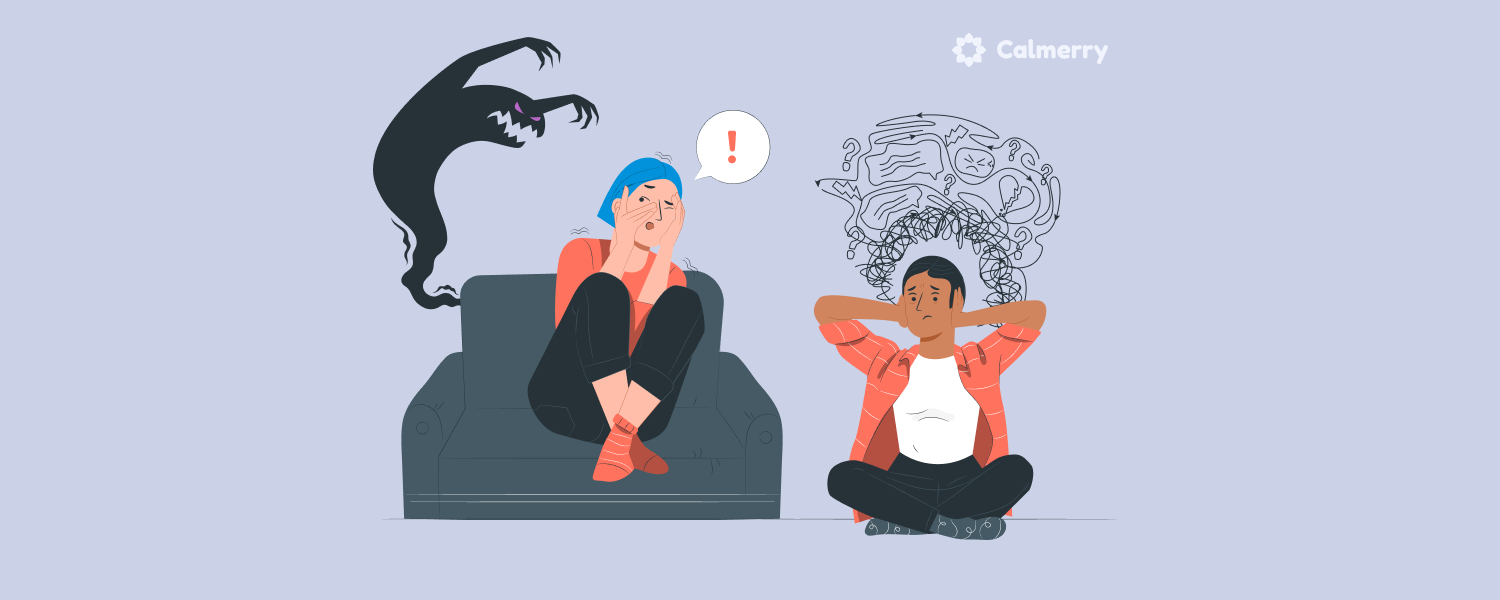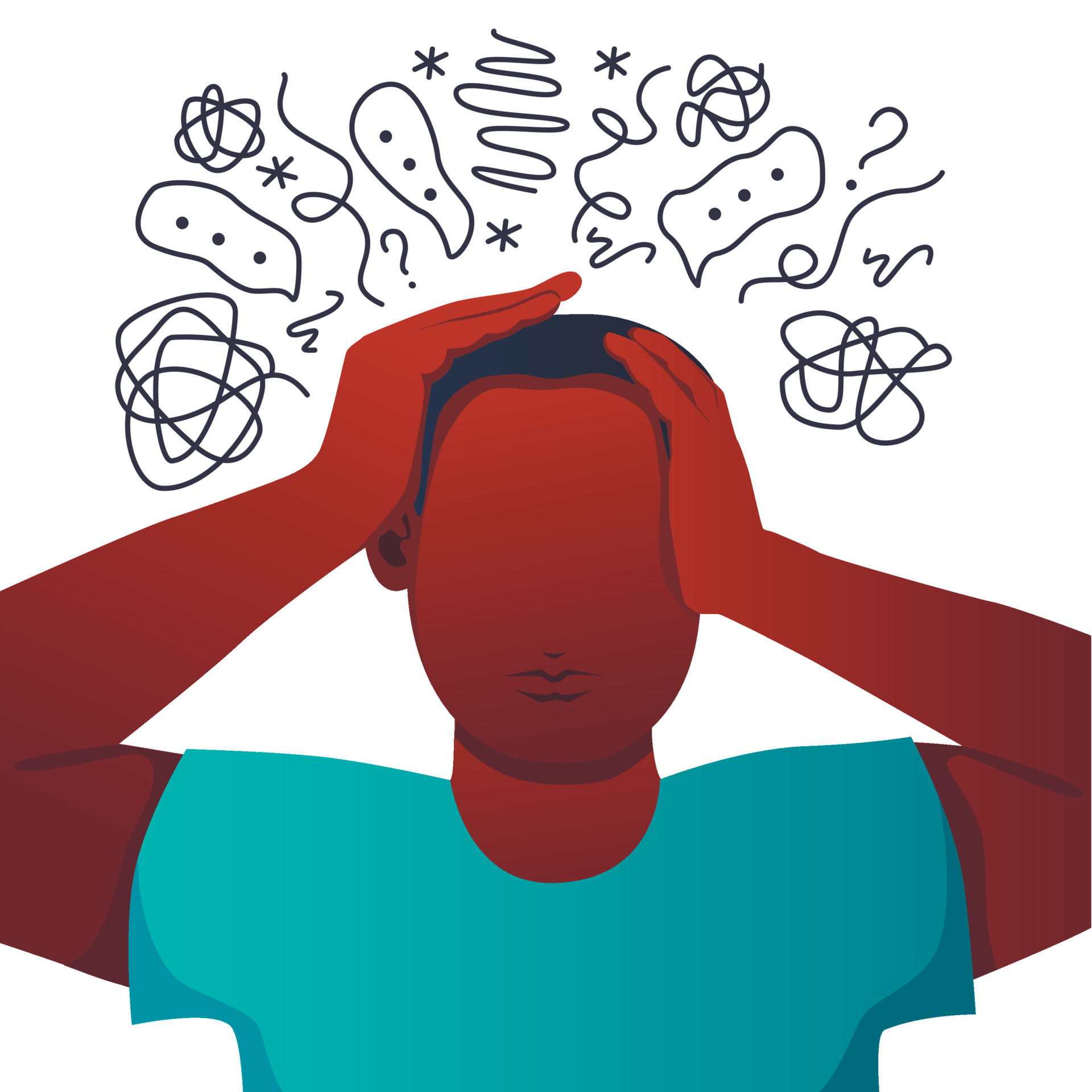
Fear vs. Anxiety – What’s the difference?
When humans find themselves in tense or extraordinary situations where they have little or no control over the outcome, they often experience feelings of anxiety and fear. Our brains are wired to detect danger and respond, but sometimes they struggle to differentiate between modern anxiety-provoking thoughts and actual physical threats. This is due to the amygdala, a set of neurons in the brain that processes emotions, and the limbic system signaling our bodies to react to our anxious thoughts.
Biologically, we are driven to have control over various aspects of our lives. When we do have control, the ventral medial prefrontal cortex is activated, which can provide a sense of reward and satisfaction in relevant situations. However, the reality is that many things are beyond our control.

In other words, it’s common for anxious thoughts and feelings to take over our minds, causing disturbances when we need to focus on an interview. It’s important to acknowledge that feeling anxious or fearful during interviews is a natural response and not a reflection of a person’s worth or competence.
One common fear that many people cannot control is the fear of job interviews. This fear often stems from the belief that a person’s self-esteem depends on their performance in interviews. A recent survey by Everest College found that 92 percent of Americans fear at least one aspect of job interviews. The study revealed that an individual’s level of education, gender, income, and age influence their specific fears related to interviews.
Research by Mark Leary and Robin Kowalski on social anxiety suggests that the fear of negative assessment, a common psychological phenomenon where individuals worry about being negatively judged by others, often contributes to anxiety during job interviews. Given the high stakes of convincing a potential employer to hire them, the fear of receiving a negative evaluation can be particularly intense.
This idea is supported by Levashina and Campion’s study, which indicates that this fear originates from the belief that the interviewer is assessing the interviewee’s worth and competence, leading to feelings of self-doubt and anxiety. Unfortunately, these feelings and thoughts can be distracting and negatively impact performance on cognitively demanding tasks. As Eysenck et al. state, “anxious individuals tend to allocate attentional resources to threat-related stimuli, whether internal (worrisome thoughts) or external (threatening task-relevant distractions).
This anxiety often arises from the desire to gain approval or validation from an authority figure, and it can be managed through various strategies discussed below:
Preparation: If you don’t prepare adequately before the interview, you’re likely to feel nervous as the interview day approaches. To avoid last-minute stress, it’s highly recommended to be fully prepared two to three days before the interview. Practice your responses in front of a mirror and imagine the interviewer as the audience. Begin with simple questions about your goals and background before addressing more challenging ones, such as the most important lesson you’ve learned from a mentor.
Research & Study the Company Before the Interview: Thoroughly researching the company can boost your self-assurance and readiness, even allowing you to look forward to the interview. You can harness your nervous energy to your advantage by being well-prepared. When your career goals are at stake during the interview, the more you practice and prepare, the more confident you’ll feel. This confidence can help you manage your body language and eliminate nervous behaviors like swaying, leaning, or fidgeting.
Go beyond the company’s website and delve into its employees, communication style, social media presence, and corporate culture. Analyze the job description and incorporate its language into your answers. Connect your experiences to the position by diving deeper into the company’s leadership and differentiators among competitors.
Resume: Ensure your resume is comprehensive and can cover all the points you’ve mentioned. Avoid providing false information, as being caught in a lie can harm your prospects. Review your resume to identify potential areas where the interviewer may have questions and prepare to address them.
Practice Questions: Common interview questions, such as “Tell me about yourself,” can be among the most challenging to answer. Preparing for these predictable questions can ease your mind and ensure you respond confidently. Be ready for questions like:
Professional Dress: Plan your interview outfit in advance. Dress appropriately for the position you’re applying for. Safe and suitable choices include clean, neutral attire such as pants, dress shirts, and jackets. The goal is for the interviewer to focus on you, not your clothing, so avoid attention-grabbing colors, patterns, or revealing outfits.
Overcoming Self-Doubt and Sabotage: Self-doubt can hinder your confidence, leading to thoughts like, “I lack the necessary experience or qualifications.” Instead of succumbing to panic, redirect these thoughts positively. Turn anxiety into excitement, as both emotions elicit similar physiological responses. Remember that you have the skills and abilities required for success.
Altering Your Perspective: Changing your perspective on interviews is crucial. Recognize that it’s not a visit to the doctor causing discomfort, but a conversation with another person. The job market offers numerous opportunities, and if you don’t get a particular job, it may not have been the best fit, with other opportunities waiting. Understand that the interview is a two-way interaction, where both parties evaluate each other. Assess if the company and role align with your preferences and career goals.
Don’t Stop Searching: Always seek job opportunities even when employed to avoid feeling trapped. No position is entirely secure, and circumstances can change rapidly. By building a strong professional network and staying informed about job options, you can better prepare for unexpected changes in your current job, such as layoffs or restructuring.
Best Places to Search for Jobs: Job searching helps you stay informed about market changes, new job opportunities, and evolving skill requirements. It also allows you to understand your value in the job market and identify areas where you can improve your skills. Consider platforms like online job boards, company websites, professional associations, staffing agencies, and networking to uncover job openings.
Best Side Hustles: The best side hustle aligns with your skills, interests, and schedule while allowing you to earn extra income. Consider options like freelancing, affiliate marketing, dropshipping, real estate investing, and more, depending on your skills and goals.
Diversifying Ideas of Work: Expand your horizons by exploring various industries, career paths, and skills. Consider your interests and hobbies, look beyond a single industry, examine job descriptions, think about remote work, launch a side business, and seek mentorship from experts in different fields to discover new career opportunities.
Below are some great top sources to get you ready for that interview!
Tips for Impressing
Interviewing is all about selling yourself to the interviewer to make them want to hire you. This resource breaks down how you can impress your interviewer so can be equipped and ready for any question they throw at you while also being personable and true to yourself.
A Psychologist’s Guide to Managing Your Anxiety Before, During, and Even After a Job Interview
Sometimes experiencing feelings of anxiousness can come off as a shock to us, and getting a professional explanation for why you feel that way can bring serenity to the mind. Here is a resource if you want a psychologist’s insight on interview anxiety.
How to Prepare for a Job Interview
Gives deep insight and recommendations on ways to prepare for an interview. Can be a helpful resource to look at prior to an interview to ease the anxiety some may be experiencing and give you the upper hand to determine how to answer common questions.
9 reasons why interviews make you nervous
Here is a page that dives into different reasons someone could get nervous when interviewing. This resource also offers explanations for that feeling of anxiousness and how to try and relieve such stress, normalizing the fear of interviewing.
How to Dress for Every Type of Job Interview
Picking out the right outfit can be confusing, so here is a page that breaks down how to dress properly for your interview. Use this as a resource to make sure your outfit gives the right impression and ensures the interviewer will be focusing on you and your words rather than your outfit.
Top 7 Fears While Having a Job Interview and Ways to Overcome Them
Here is a resource that can go in-depth on some reasons why interviewing can raise fears and correlating solutions that can provide effective ways to look at those fears.
Overcoming Interview Anxiety: How to Relax Before a Job Interview
If you are nervous that you are going to experience feelings of anxiousness before or during your interview, look over these skills to ease your mind and know that you got this.
10 Ways to Overcome Your Interview Fears
This resource offers tips and recommendations to ease the mind of an interviewee that is not on the mainstream. For those who prefer to gear away from sugar-coated recommendations, this page gives the blunt truth that is comforting to the minds of someone going through interviews.
This piece was edited by Lily Cook as part of Professor Kelley Crawford’s Digital Civic Engagement course at Tulane University.
 NOLAbeings Multimedia artist Claire Bangser created NOLAbeings as a portrait-based story project that marries...
NOLAbeings Multimedia artist Claire Bangser created NOLAbeings as a portrait-based story project that marries...  Voodoo in New Orleans: Reviving history: New Orleans fortune telling This article takes a deep dive into the history of Voodoo in New Orleans, its hybridization with Catholicism, and its present-day place in the city's culture. The author visits fortune-tellers in the French Quarter, using their guidance as a tool for introspection rather than a deterministic predictor of the future. Through her experiences in New Orleans, the author feels a mystical connection to both the past and the future.
Voodoo in New Orleans: Reviving history: New Orleans fortune telling This article takes a deep dive into the history of Voodoo in New Orleans, its hybridization with Catholicism, and its present-day place in the city's culture. The author visits fortune-tellers in the French Quarter, using their guidance as a tool for introspection rather than a deterministic predictor of the future. Through her experiences in New Orleans, the author feels a mystical connection to both the past and the future. 